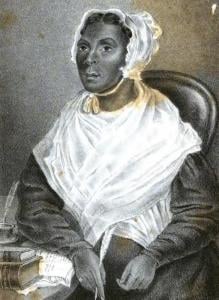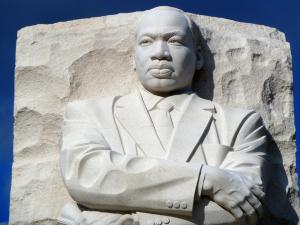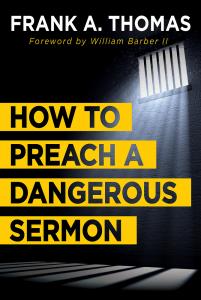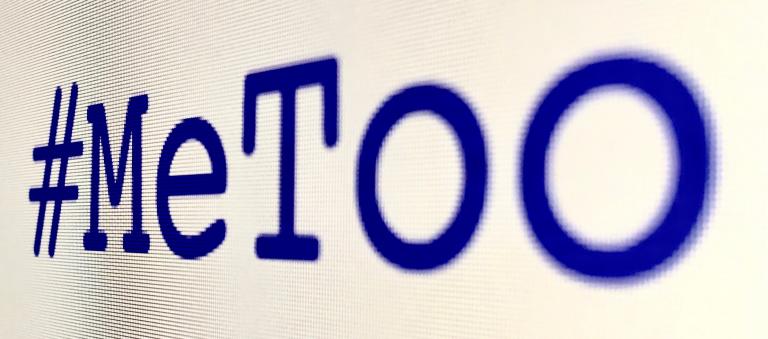Gaines, Steven Tramel. No Half Savior: Jarena Lee’s Autobiography as Prophetic Rhetoric. Carolinas Communication Annual. Vol. XXXIII, 2017
The tradition of prophetic rhetoric stretches back to ancient Hebrew literature, and James Darsey’s The Prophetic Tradition and Radical Rhetoric in America provides a fresh foundation for the study of prophetic rhetoric in the United States of America. Darsey’s book focuses on white men, and more recent scholarly literature further expands our understanding of prophetic rhetoric. For example, Kerith Woodyard urges the tradition to consider women who communicate prophetically, while Andre E. Johnson and Christopher Z. Hobson explore speeches and writings by African American men. This essay combines those expansions to investigate prophetic rhetoric in a text by Jarena Lee, an African American woman.
“One of the first African American women known to have preached the gospel in the thirteen colonies,” Jarena Lee “is regarded as the first woman preacher in the African Methodist Episcopal (AME) Church.” She was born on February 11, 1783, in Cape May, New Jersey. Her parents were poor, and her maiden name is unknown. She worked as a domestic servant for over a decade, in which she learned to read and write. Following spiritual experiences in which she received her call to preach, she informed her bishop, AME founder Richard Allen, of her calling, which he resisted. Years later, when Allen finally heard Lee preach, he affirmed her calling but did not ordain her to the ministry of preaching. Instead, he limited her to speaking outside the main meetings of the religious establishment. Despite this marginalization, Lee’s preaching ministry included countless miles, chronic illness, ecstatic results, and danger as she spoke in slave states. Her journal, in which she argued for her right to preach, first appeared in 1836, was printed again in 1839 and was widely distributed.
This essay claims that Jarena Lee’s spiritual autobiography, especially the section in which she explained her right to preach, functioned as prophetic rhetoric within her religious community. Prophetic rhetoric calls for change and anchors that call in foundations that the communicator and her audience treat as sacred (i.e. deeply treasured). The “sacred” may or may not be overtly religious, but for Lee it was. She grounded her narrative and arguments in the Bible, theology, church tradition, and spiritual experiences. That engagement with religious foundations distinguishes the autobiography as a spiritual one. In noting Lee’s autobiography’s prophetic elements, I make four contributions to the field. First, I demonstrate that the genre of spiritual autobiography has value as a site of prophetic rhetoric. Second, I heed Woodyard’s call to decrease the white patriarchy of the canon of prophetic rhetoric. Third, I expand the field’s contextual scope. Recent scholars of prophetic rhetoric have focused on communication from a religious community to a larger society, and I consider communication that both originates in and addresses a religious community. Fourth, I consider hermeneutical dimensions of prophetic rhetoric at an intersection of race, sex, and class. In making those contributions, I offer three sections in this essay’s body. The first section briefly explains spiritual autobiography, describes Jarena Lee’s spiritual autobiography and begins to shift into
In noting Lee’s autobiography’s prophetic elements, I make four contributions to the field. First, I demonstrate that the genre of spiritual autobiography has value as a site of prophetic rhetoric. Second, I heed Woodyard’s call to decrease the white patriarchy of the canon of prophetic rhetoric. Third, I expand the field’s contextual scope. Recent scholars of prophetic rhetoric have focused on communication from a religious community to a larger society, and I consider communication that both originates in and addresses a religious community. Fourth, I consider hermeneutical dimensions of prophetic rhetoric at an intersection of race, sex, and class. In making those contributions, I offer three sections in this essay’s body. The first section briefly explains spiritual autobiography, describes Jarena Lee’s spiritual autobiography and begins to shift into analysis. The second introduces a theoretical foundation for the study of prophetic rhetoric and analyzes Lee’s words through that lens. The third explores the influences of race, sex, and class on Lee’s interpretation of ancient texts deemed sacred by her community.
Read the rest of the essay here.
Steven Tramel Gaines preaches for Cordova Community Church and is a PhD student at the University of Memphis, researching rhetoric, race, and religion.
Donate to the Work of R3
Like the work, we do at Rhetoric Race and Religion? Please consider helping us continue to do this work. All donations are tax-deductible through Gifts of Life Ministries/G’Life Outreach, a 501(c)(3) tax-exempt organization, and our fiscal sponsor. Any donation helps. Just click here to support our work.













